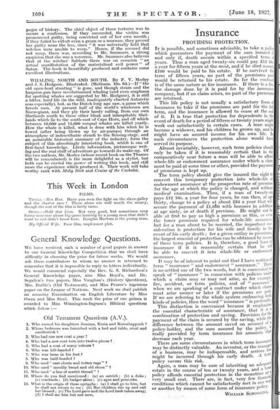Insurance
PROVIDLNG PROTECTION.
IT is possible, and sometimes advisable, to take a policy which guarantees the payment -of the sum insured it and only if, death occurs within a specified term of years. Thus a man aged twenty-six could pay £12 lk a year for fifteen years at the most, and if he died sooner, £100 would be paid to his estate. If he survived the term of fifteen years, no part of the premiums paid would be returned to his estate. So far the contract is of the same nature as fire insurance. If there is a fire, the-. damage done by it is paid for by the insurance company, but if no claim arises, no part of the premiums are returned.
This life policy is not usually a satisfactory form of insurance to take if the premiums are paid for the full term, and the insurance is allowed to cease at the end of it. It is true that protection for dependents in the event of death for a period of fifteen or twenty years might work out satisfactorily in certain cases. A man might become a widower, and his children be grown up, and he might have an assured income for his own life. In such circumstances the protection alone would have served its purpose. Almost invariably, however, such term policies should only be taken if it is reasonably certain that in the comparatively near future a man will be able to afford whole-life or endowment assurance under which a claim must be paid at some time or other, provided the payment of premiums is kept up. The term policy should give the insured the right to convert this temporary protection into whole-life or endowment assurance at the prospectus rate of premium for the age at which the policy is changed, and without medical examination. Thus, if a man of twenty-six pays £12 10s. a year for four years, he can then, at age thirty, change to a policy at about £34 a year that will secure the payment of £1,00 with bonuses in addition at age sixty, or at death if previous. He might not he able at- first to pay so high a premium as this, or even the lower premium required for whole-life assurance, but for a man about to be married, the important con• sideration is protection for his wife and family in the event of his early death ; for a given outlay in premiums, the largest amount of protection can be obtained by means of these term policies. It is, therefore, a good form of insurance if it is reasonably certain that lie will be able to convert it into whole-life or endowment assurance. It may be of interest to point out that I have written of term " insurance " and endowment " assurance." There is no settled use of the two words, but it is convenient to speak of " insurance " in connexion with policies under which a claim may, or may not arise, as for example il fire, accident, or term policies, and of " assurance" when we are speaking of a contract under which claims must arise sooner or later if the premiums are paid. If we are referring to the whole system embracing both kinds of policies, then the word " insurance " is preferable, This distinction is convenient because it emphasize; the essential characteristic of assurance, that it is 3 combination of protection and saving. Provision for the payment of the claim is secured by the saving, while the difference between the amount saved on account of 8 policy-holder, and the sum assured by the policy, is really provided by term insurance for amounts that decrease each year. There are some circumstances in which term insurium may be distinctly valuable. An inventor, or the manager of a business, may be indispensable, and serious los' might be incurred through his early death. A terrt policy covers this risk. Again, a man may be sure -of inheriting an adequat' estate in the course of ten or twenty years, and a toll policy affords essential protection in the meantime at very small cost. There are, in fact, very few financi5* conditions which cannot be satisfactorily met in one wg or another by means of some form of insurance policy.
WILLIAM ScitooLngt,


























































 Previous page
Previous page